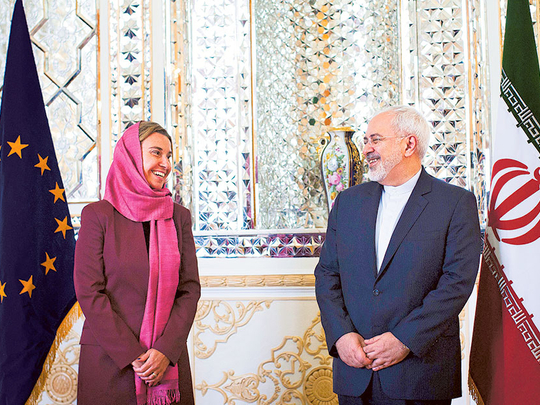
Tehran: Iran and the European Union have agreed to start talks on various issues, Iranian Foreign Minister Mohammad Javad Zarif told a joint news conference with the EU’s chief diplomat Federica Mogherini in Tehran.
“High-level talks will be held between Iran and the European Union over different issues, including energy cooperation ...
human rights, confronting terrorism and regional issues,” Zarif said.
Mogherini said implementation of a deal reached between Iran and six major powers in Vienna on July 14 “depends on political will of all parties involved”, adding: “The implementation of the deal will pave the ground for wider cooperation between Iran and the West.”
As the European Union’s high representative, Mogherini was a lead negotiator for the six powers in the long-running diplomacy that culminated in the July 14 agreement.
She flies in from talks in Iran’s regional rival Saudi Arabia, whose leaders told her of their deep misgivings about Tehran’s intentions.
Riyadh has not publicly condemned the agreement but the deal has come under furious attack by Israel and Republican lawmakers in the US Congress.
Under the deal, Iran must take measures at its nuclear facilities to satisfy UN monitors of their peaceful nature.
In return, the powers must finalise the mechanism for the lifting of UN and Western sanctions.
The deal has been strongly welcomed in Tehran with officials lining up to back the government’s success in securing relief from crippling sanctions in exchange for curbs on some but not all of its nuclear activities.
As the agreement goes under a potentially bruising review in the US Congress, President Barack Obama has defended it as the best way to avoid nuclear proliferation and another possible conflict in the Middle East.
Iran has always denied seeking an atomic weapon but the deal has not put a stop to the accusations of its arch critics that the bomb is its eventual aim.
Obama has sought to head off the criticism by stressing that the deal does not preclude military action if Iran welches on its side of the bargain, comments that have met with a frosty reception in Tehran.
The nuclear deal has further strained Iran’s relations with Saudi Arabia, already troubled by the crisis in Yemen.












